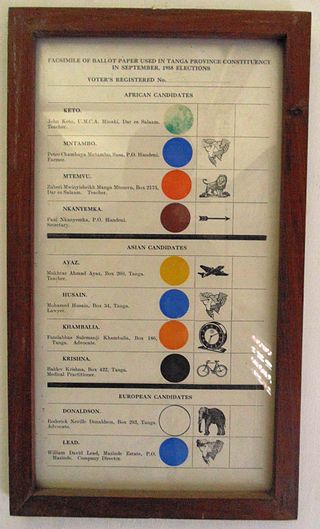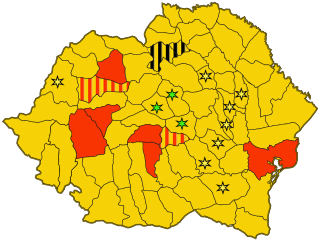
General elections were held in Sierra Leone Colony and Protectorate in May 1957. A total of 39 seats were up for election, whilst another 12 paramount chiefs were indirectly elected.

General elections were held in Sierra Leone on 25 May 1962, just over a year after the country gained independence from the United Kingdom. This was the first to be held under universal suffrage. The elections were won by the ruling Sierra Leone People's Party (SLPP), although the party received fewer votes than independent candidates. SLPP leader Milton Margai remained Prime Minister.

General elections were held in Swaziland on 19 and 20 April 1967 to elect members of the House of Assembly. The result was a second successive victory for the royalist Imbokodvo National Movement, which won 79.4% of the vote and all 24 seats.

General elections were held in Tanganyika in September 1958 and February 1959. Elections were held in five constituencies on 8 and 12 September 1958, and in the other five on 9 and 15 February 1959. The Tanganyika African National Union (TANU) and affiliated independents won all 30 elected seats in the Legislative Council.

General elections were held in Rwanda on 10 March 1965, the first direct one in the country and the first since independence in 1962. At the time, the country was a one-party state with MDR-Parmehutu as the sole legal party. Its leader, Grégoire Kayibanda, ran unopposed in the country's first election for President. Voter turnout was 88%.

General elections were held in Rwanda on 29 September 1969. At the time, the country was a one-party state with MDR-Parmehutu as the sole legal party. Its leader, Grégoire Kayibanda, ran unopposed in the presidential election. Voter turnout was 90.9%.

Territorial Assembly elections were held in French Gabon on 31 March 1957. Although the Gabonese Democratic and Social Union (UDSG) won 14 of the 40 contested seats, the Gabonese Democratic Bloc was able to form a 21-seat coalition with the Entente–Defence of Gabonese Interests and five other MPs.

Parliamentary elections were held in British Somaliland on 17 February 1960. The result was a victory for the Somali National League (SNL), which won 20 of the 33 seats in the Legislative Council.

Parliamentary elections were held in Sudan on 2 and 25 November 1953, prior to the implementation of home rule. The result was a victory for the National Unionist Party, which won 51 of the 97 seats in House of Representatives. The NUP also obtained a majority in the Senate, where they won 21 of the 30 indirectly elected seats and 10 of the 20 members were nominated to the Senate by the British Governor-General. Although the Umma Party and some of the British press alleged that Egypt had interfered in the election, it was generally seen as free and fair.

Presidential elections were held for the first time in the Republic of Upper Volta on 3 October 1965, as previously the President had been appointed by the National Assembly. At the time, the country was a one-party state, with the Voltaic Democratic Union–African Democratic Rally (UDV–RDA) as the sole legal party. Its leader, Maurice Yaméogo, was the only candidate, and was re-elected with 100% of the vote. Voter turnout was 98.4%.

General elections were held in Liberia in May 1955. For the first time since 1931 there was more than one candidate in the presidential election. However, William Tubman of the True Whig Party was easily re-elected, winning over 99.5% of the vote.

Presidential elections were held in Algeria on 10 December 1976. Incumbent Houari Boumediene, leader of the National Liberation Front, was the only candidate, and was elected unopposed with 99.46% of the vote.

Presidential elections were held in the United Arab Republic on 15 March 1965. The election took the form of a referendum on the candidacy of Gamal Abdel Nasser, who ran unopposed. He allegedly won with almost seven million votes, and only 65 against. Voter turnout was stated to be 99%.

Territorial Assembly elections were held in French Sudan on 31 March 1957, the first elections in the territory to be held under universal suffrage. The result was a victory for the Sudanese Union – African Democratic Rally. which won 57 of the 70 seats. Voter turnout was just 34.0%.
General elections were held in East Germany on 20 October 1963. They were to originally be held in November 1962 but were postponed. 434 deputies to the Volkskammer were elected, with all of them being candidates of the single-list National Front, dominated by the communist Socialist Unity Party of Germany.

General elections were held in Romania in May and June 1926. The Chamber of Deputies was elected on 25 May, whilst the Senate was elected in two stages in May and 10 June. The result was a victory for the governing People's Party, which, together with the allied Romanian National Party, Magyar Party and German Party, won 292 of the 387 seats in the Chamber of Deputies and 107 of the 115 seats in the Senate elected through universal male vote. With some exceptions, the Peasants' Party and the main branch of the National Party ran on common lists under the name of National Peasant Bloc.

General elections were held in Romania in July 1927. The Chamber of Deputies was elected on 7 July, whilst the Senate was elected in three stages on 10, 12 and 14 July. The result was a victory for the governing National Liberal Party (PNL), which won 318 of the 387 seats in the Chamber of Deputies and 92 of the 110 seats in the Senate elected through universal male vote.
General elections were held in Romania in June 1931. The Chamber of Deputies was elected on 1 June, whilst the Senate was elected in three stages on 4, 6 and 8 June. The result was a victory for the governing National Union, an alliance of the National Party, the National Liberal Party, the German Party, the Agrarian Union Party, the Vlad Ţepeş League, the Agrarian League and several other parties. The Union won 289 of the 387 seats in the Chamber of Deputies and 108 of the 113 seats in the Senate elected through universal vote. The five seats won by the Communist-dominated Peasant Workers' Bloc were ultimately invalidated by the new Parliament.
General elections were held in Romania in July 1932. The Chamber of Deputies was elected on 17 July, whilst the Senate was elected in three stages on 20, 24 and 26 July. The result was a victory for the governing National Peasants' Party-German Party alliance, which won 274 of the 387 seats in the Chamber of Deputies and 104 of the 113 seats in the Senate elected through universal male vote. Of the 274 Chamber seats, 265 were taken by the National Peasant's Party and nine by the German Party.
General elections were held in Romania in December 1933, the third in three years. The Chamber of Deputies was elected on 20 December, whilst the Senate was elected in three stages on 22, 28 and 29 December.














